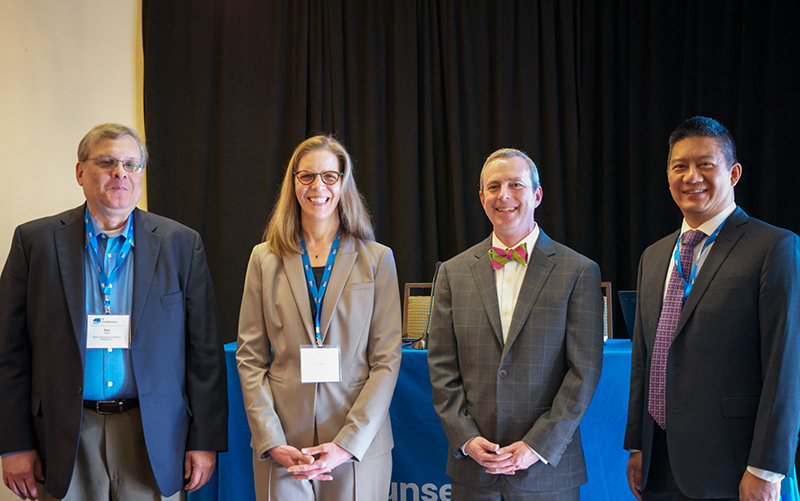One Saturday in 2019, Mike Lavorel went out with some friends and ordered some oysters. By Monday, he was ill and by Tuesday, he needed an ambulance. Mike found himself in a nine-month battle with sepsis. He fell into a coma. He lost several fingers and his lower legs, but he survived, to the amazement of doctors, who called him “the Miracle Man.”
After beating the odds, Mike is now looking for a kidney transplant to remedy the organ damage caused by his battle with sepsis. As his wife Jennifer explains, if a volunteer agrees to donate a kidney but is not a tissue match for Mike, their donation can still benefit Mike via the National Kidney Registry’s Paired Donation Program. This innovative model helps patients like Mike find a match more quickly.
The Lavorel family’s battle not only with sepsis but also the aftermath is emblematic of the challenges many sepsis survivors face. With the increase in antimicrobial resistance (AMR), more patients will suffer, and more patients will likely need transplants, like Mike.
October 15-21 is International Infection Prevention Week, a time when we raise awareness of all infections, including sepsis, which can be acquired from many sources, even the hospital, and is fast-acting and deadly.
Fighting sepsis
Mike’s sepsis came from Vibrio vulnificus, a form of bacteria that can infect people eating uncooked oysters or other sources of shellfish, especially those with immunodeficiency disorders. Studies show that Vibrio vulnificus, which can also impact people with open wounds swimming in brackish water, is expanding its range further north due to climate change. The increase in prevalence of this bacterium motivated the Centers for Disease Control and Prevention (CDC) to issue a health advisory last month.
Mike’s close brush with death taught the family some crucial lessons.
“First: Don’t eat raw oysters,” said Jennifer. She said she had never imagined the risks. “It’s not something we expected. It’s not something anyone would or should expect.”
Another lesson the Lavorels learned was that it can be difficult to diagnose sepsis, which can initially mimic the flu or food poisoning but quickly leads to devastating symptoms.
“I would say do not ignore this ‘worse than I’ve ever felt’ symptom. See a doctor. Insist on a blood test,” said Jennifer. “Make sure the doctor, if reluctant to administer a blood test or dismissive about your concerns, understands that you want to rule out sepsis. Don’t be timid about it. Don’t worry about questioning a professional. If you’re wrong, no harm. If you’re right, it may be too late once the diagnosis has been confirmed.”
Aware of AMR
As with all sepsis cases, the key to Mike’s survival was fast action. Luckily, the ambulance technicians who responded to the Lavorels had the foresight to see that Mike needed to go to a specialty hospital.
“We are fortunate to have good health insurance. We are fortunate to live in an area with plentiful medical care. Suburban Hospital, where the ambulance had taken Mike, is a trauma center,” said Jennifer.
She praised the facilities and the team who saved Mike, but also acknowledged that if he’d been infected by an AMR superbug, things could have been different.
“We were being treated within a system that has benefited from an enormous investment of resources, from the medical training of the staff to the physical plant to the drugs and instruments, machines, monitors—all of it world-class,” she said. “All of it would amount to nothing in the face of the tiniest microbe for which we lack a treatment. It’s a terrifying thought. The phrase ‘sound and fury’ comes to mind.”
When it comes to addressing AMR, Jennifer expressed support for legislation to support the development of new antimicrobials. Because antimicrobials are most effective when used sparingly, and are generally for one-off treatments, the usual market mechanisms do not support development of new antimicrobials. The PASTEUR Act would reward value instead of volume, to ensure greater antimicrobial development.
“The subscription concept in the PASTEUR Act makes sense to me: Yes, we should incentivize drug companies to develop therapies for which there is no immediate market demand,” said Jennifer.
Next challenge: Kidney donation
Mike’s initial battle with sepsis was followed by subsequent victories, as he learned to adapt to his amputations and returned to work and normal activities. He is now determined to conquer his latest challenge: surviving the kidney disease brought on by his sepsis. For now, he is on dialysis, awaiting a kidney donor.
Both Jennifer and Mike’s best friend sought to donate but were ruled ineligible. However, anyone who is eligible and donates in Mike’s name—even if they are not a match—can ensure he gets a kidney quickly.
“If someone steps forward to donate on his behalf, it means an average of 39 days rather than the 3-5 year wait we should otherwise expect. Because of the risk of infection from dialysis, 39 days sounds pretty good! Maybe someone reading this will be moved to donate a kidney to someone whose life literally depends on it”
The Miracle Man is waiting for the next miracle. Find out more here.




